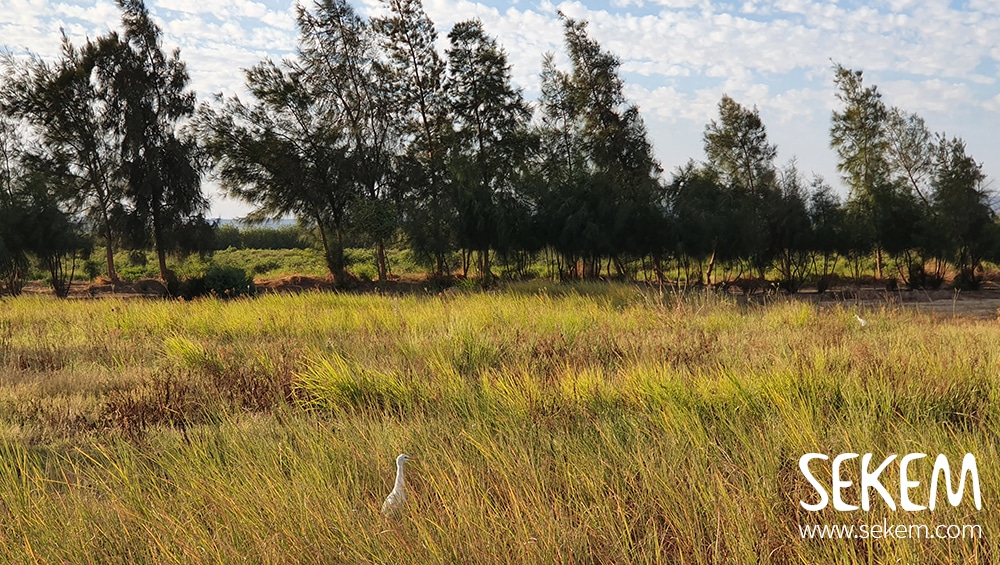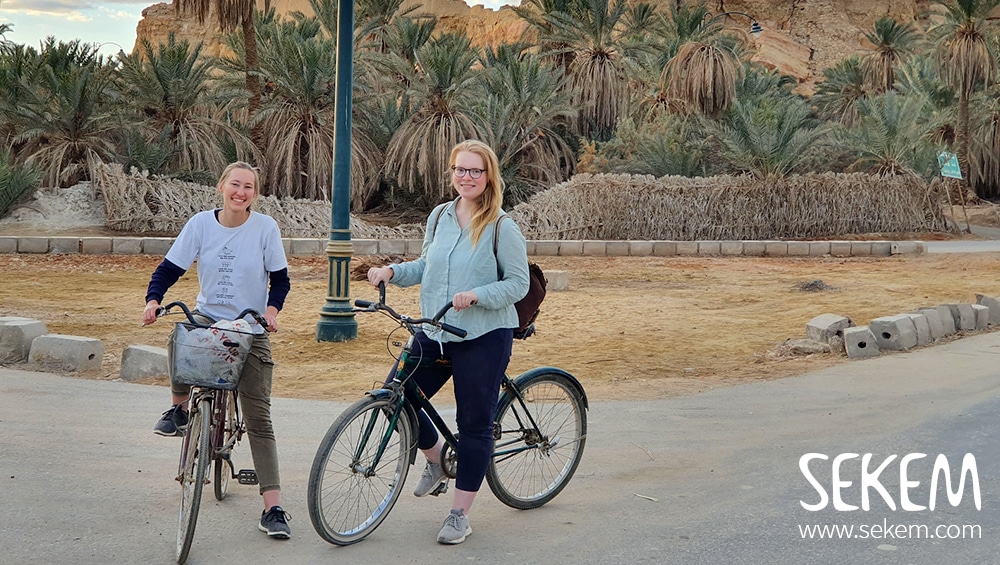“Unfortunately, there is still so much we don’t know about biodiversity even though it might even be a more pressing issue than climate change. That’s mainly due to the lack of understanding of its major effect on the ecosystem and awareness that humanity is directly dependent on healthy ecosystems ,” explains Agnes Kuhrt a 22-year-old student.
Agnes Kuhrt and Theresa Peters are students of Environmental Science at Leuphana University in Lüneburg, who decided to join SEKEM for the duration of 10 months to try to answer their research question: does the cultivation change the species composition and abundance on the Wahat desert farm? The two students are traveling to Wahat regularly to monitor different types of insects, birds and plants in order to find out how the ecosystem is affected when you start to farm the desert. “I found SEKEM to be an inspiring ground for this research as they follow a solution-oriented approach where theory and practice can be combined,” expresses Theresa.
Youth, experience, and impact
Agnes has always been drawn to nature, and used to go hiking frequently with her family. She decided to travel to explore the Amazon rainforest, and this experience led her to pursue her studies in Environmental Science; where she met her friend and colleague Theresa. Theresa also grew up surrounded by nature in the forest of Germany. After hearing from Helmy Abouleish about SEKEM at a conference a few years ago, both young students had the wish to experience this holistic community. “SEKEM’s vision includes biodiversity as it is a topic of crucial importance for a sustainable future, but it is still at the beginning. That’s why we are trying to facilitate a start of research, growth of awareness and action in regard to this issue to help to fulfill this vision” says Agnes. Their time in Egypt is divided between SEKEM Wahat for field research and Heliopolis University for sustainable development, working with professors and students. “In Wahat, I was amazed by the vast desert land in contrast with the reclaimed areas. The different stages and practices you can see on the desert farm allow us to find out more about the effect of cultivation on the ecosystem,” exclaims Theresa.
The young students’ experience is not limited to research and academic or even field knowledge, they are equally interested in the cultural aspect. Agnes explains: “I’m very intrigued by the Egyptian culture, and I feel that SEKEM adds a unique angle to that. I find cultural diversity within the community, but I still need to discover the ways to exchange it. Especially in Wahat it surprises some people that two young women travel to the desert on their own to do field research there. This convergence of cultures opens opportunities for exchange about different views and opinions and offers fruit for thought.” Theresa adds: “I want to have a better understanding of the Egyptian culture and I believe this will contribute to my personal growth as well. I think we can learn a lot from each other and we need to develop mutual understanding to face the global challenges.”
Every creature matters
The balance and functioning of the ecosystem relies on biodiversity; each species is essential to the life cycle of another. This includes the variety of species, the genetic variety within each species and the variety of ecosystems that they live in.

Nearly 600 plant species have recorded as extinct since the 16th Century, and many more species have likely gone extinct unnoticed. Currently around one million species are at risk of extinction at an extinction rate which is faster than it ever was before, likely leading to a new mass extinction event in the near future.
There are multiple reasons for the biodiversity loss, while land use change being the leading one of them. Agriculture is the major driver for land use change, this combined with current agricultural practices like overuse of pesticides, fertilisers and monocultural cropping has a devastating effect on the ecosystem. “With the goal of a sustainable future including the protection of biodiversity, it becomes clear that we need to review our practices which are throwing off the balance and harmony of the ecosystem. We should take measures to protect the natural environment with a holistic consideration of agricultural, economic, and cultural practices. This starts from our behavior as individuals as well as communities towards the environment we are part of,” explains Agnes. Hence, the two students see the enormous challenges and yet go to work for a better tomorrow with great enthusiasm and confidence. “Biodiversity is a very fascinating and interesting topic. The more we learn, the more we realize how interwoven everything in nature is and that there is always more to explore which has great potential,” concludes Theresa.
SEKEM Friends Netherlands
SEKEM Friends Germany

